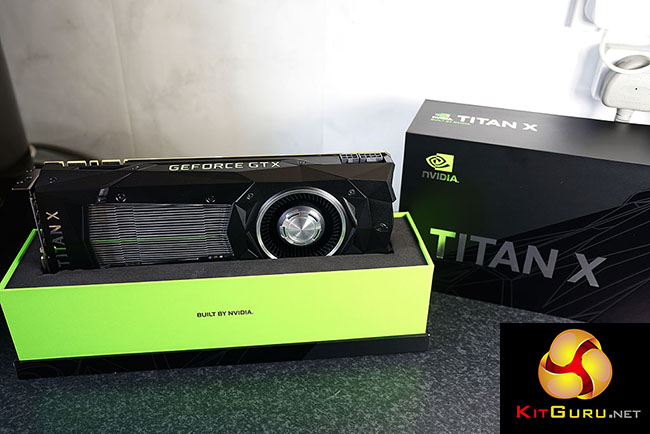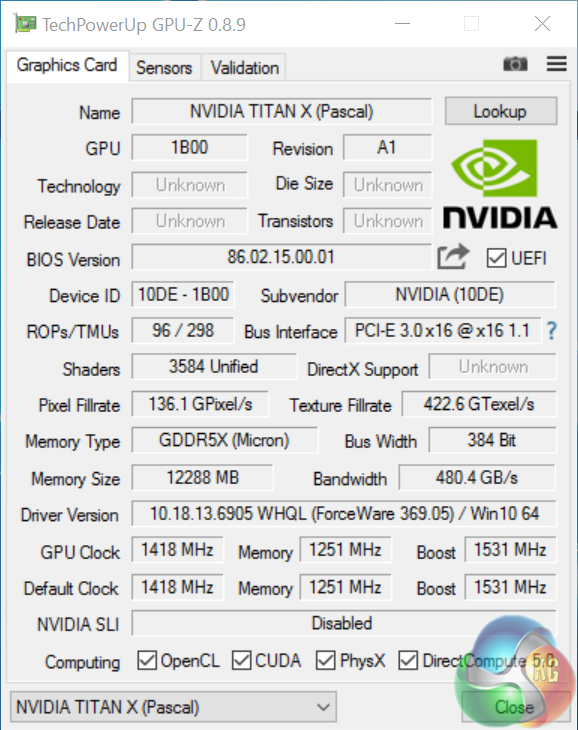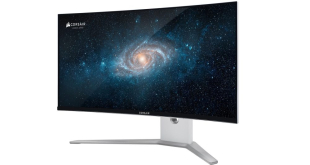
Nvidia's GTX 1080 has been dominating the high end this year with AMD placing focus in the low end to mid range market with their RX 480, RX 470 and RX 460. Nvidia CEO Jen-Hsun Huang has described the latest Titan X as ‘The Ultimate' and at an eye watering price of £1099.99 we expect performance to be nothing less than class leading.

The Titan X (Pascal) arrived with us some time ago, but due to a backlog in other reviews I was only able to approach this review recently. I also wanted to add in Total War: Warhammer and Doom 2016 game tests, so its taken a little longer than expected.
The Titan X sample arrives in a slim line black and green box, direct from Nvidia – it is compact packaging without any frills. The card is reference cooled making it a great solution to use in SLi as all the hot air is pumped out the rear of the chassis. Yes, a big fat bank balance is required.
| GPU | Nvidia Titan X (Pascal) | Nvidia GTX 960 | Nvidia GTX 970 | Nvidia GTX 1060 | Nvidia GTX 1070 | Nvidia GTX 1080 |
| Streaming Multiprocessors / Compute Units |
30 | 8 | 13 | 10 | 15 | 20 |
| GPU Cores | 3584 | 1024 | 1664 | 1280 | 1920 | 2560 |
| Base Clock | 1418 MHz | 1126 MHz | 1050 MHz | 1506 MHz | 1506 MHz | 1607 MHz |
| GPU Boost Clock | 1531 MHz | 1178 MHz | 1178 MHz | 1708 MHz | 1683 MHz | 1733 MHz |
| Total Video memory | 12288 MB | 2048 or 4096 MB | 4096 MB | 6144 MB | 8192 MB | 8192 MB |
| Texture Units | 298 | 64 | 104 | 80 | 120 | 160 |
| Texture fill-rate | 136.1 GT/s | 72 GT/s | 109.2 GT/s | 120.5 GT/s | 180.7 GT/s | 257.1 GT/s |
| Memory Clock | 10Gbps | 7Gbps | 7Gbps | 8 Gbps | 8Gbps | 10Gbps |
| Memory Bandwidth | 480 GB/s | 112 GB/s | 224 GB/s | 192 GB/s | 256 GB/s | 320 GB/s |
| Bus Width | 384-bit | 128-bit | 256-bit | 192-bit | 256-bit | 256-bit |
| ROPs | 96 | 32 | 56 | 48 | 64 | 64 |
| Manufacturing Process | 16nm | 28nm | 28nm | 16nm | 16nm | 16nm |
| TDP | 250 W | 120 W | 145 W | 120 W | 150 W | 180 W |
On paper the Titan X (Pascal) is a beast. It has 3,840 CUDA cores spread across 30 streaming multiprocessors and six processing clusters from which 3,584 are enabled. There are 96 ROPs, 224 Texture units and 12GB of GDDR5X (Micron) memory connected via a fat 384 bit memory interface.
When we look at the GTX 1080 we can see the Titan X has a 50 percent increase in peak bandwidth due to the 384 bit memory controller. It also has a 40 percent increase in texture units/shaders per-SM. Obviously we have 12GB of memory, twice the amount incorporated on the GTX 1080.
The Titan X does give away some clock speed to the GTX 1080, meaning the cores are running slower on the more expensive model. That said, there is much more width via the Titan X ensuring performance will be improved significantly. This should ensure killer performance at 4K resolutions.
 KitGuru KitGuru.net – Tech News | Hardware News | Hardware Reviews | IOS | Mobile | Gaming | Graphics Cards
KitGuru KitGuru.net – Tech News | Hardware News | Hardware Reviews | IOS | Mobile | Gaming | Graphics Cards




I may be inclined to getting two 1080’s before I ever get a Titan. o,O
Clocks on your overclock seem a bit conservative – I’ve managed to hold a stable +235 core / 675 memory on both cards, giving me a base clock of 1655 and boost to 1770, with a memory clock of 1420, giving me 11300 effective.
Final boost with their boost 3.0 puts me in the 2150-2180 core clock range. Can’t wait to stick waterblocks on them.
and take the wife for supper , damn! 😉
the joys of the silicon lottery I am afraid. I have recently got another Titan X, and it overclocks quite a bit higher.
Yeah it seems I’ve gotten lucky – really lucky in fact, over the last few years. These tx-p’s of mine both top out near 2200 core / 11500 mem, my previous tx-maxwell’s could boost to a shade over 1550 core, and my 5960x can sustain 5.1ghz across all cores @ 1.42v, and I can push a single core to 5.6GHz. Feels like I get danmed lucky, a lot.
Waterblocks for the tx-p’s have become a more complicated problem though – I was planning on going with EKWB for the setup, but it seems the nvidia HB sli bridge the pascal cards use won’t fit with their pascal blocks, so I’ll need another solution there.
It’s kind of crazy to think that if you notice, it took in most cases until the Pascal Titan X and in others the 1080 to beat the 295×2 in a lot of benchmarks. Kind of neat that even if you bought the 295×2 at full retail of $1500USD (in the states) in took two years, a node shrink from 28nm to 16nm, and a Video Card costing $1200 to beat it in a lot of cases.
Are they not benchmarking Doom in Vulkan?
It’s neat that a single card with only around 70% of the shader cores can be equal in performance and consume half the power.
The 295×2 was fast no doubt about it, but by no means was it particularly impressive. Hot as hell, and needed a beastly power supply to feed it. And thats without overclocking.